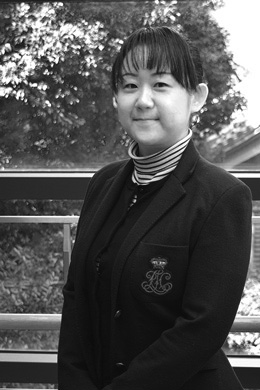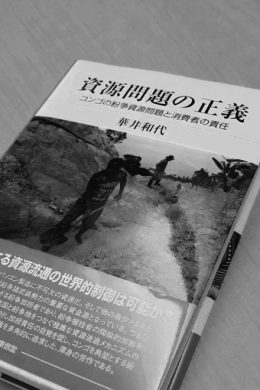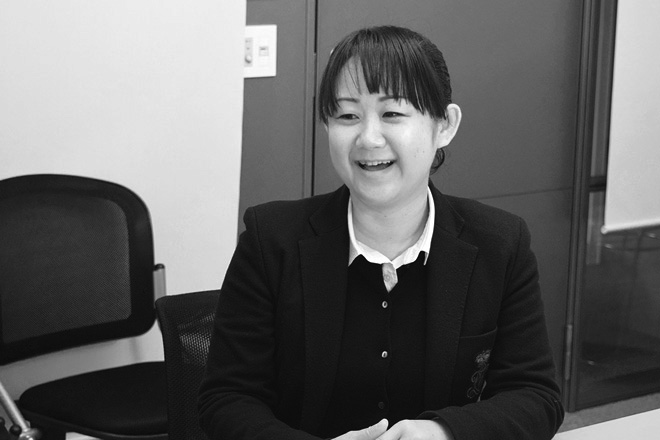Fostering Human Resources Capable of Recognizing Their Connection to the World and Solving Problems
Kazuyo Hanai / Project Research Associate, Graduate School of Public Policy

Interest in Indiana Jones led to a career in world history education.
——— Your CV says that you were a history major in college, did your graduate studies in education and that you were formerly a high school teacher. What field of history did you study?
Hanai:I studied the Old Testament. When I was a fifth grader, I saw the movie Indiana Jones and the Last Crusade and became a fan of Indiana Jones. It turns out Indiana Jones was actually a biblical archeologist. There is a scene in the movie where he is shown reading an ancient Hebrew inscription, and I decided right then and there, “This is what I want to do.” So, I went to Tsukuba University and studied oriental history. As a high school student I tutored younger students, and in college I had a part-time job at a cram school. These experiences taught me the joy of teaching others what I myself had studied and set me on the course of becoming a teacher. As an undergraduate, I was a history major, and my plan as a graduate student was to study the pedagogy of teaching history. After completing my studies, I worked for six years as a world history teacher. But there came a point where I felt I had exhausted everything that I had accumulated during my undergraduate and graduate studies. There was a great thirst within me for further study and fresh input. With an eye to returning to my teaching career, I entered the Graduate School of Public Policy at the University of Tokyo and chose the problem of conflict resources in Congo as my research topic.
——— Why Congo?
Hanai:I should start by explaining why I chose to study conflicts and disputes. During my third year in college, I travelled to Israel to see the land of the Old Testament. During my stay, I accidentally found an opportunity to visit a Palestinian refugee camp where I met an Old Testament scholar who was working for a NGO to provide support and assistance to the residents of the camp. She said to the members of our group, “You cannot be of any use here. But what I want you to do is to go back to Japan and share what you have seen here. With more Japanese people supporting our efforts, we will be able to provide the people here with greater assistance. That’s why we want you to convey what you see here to people back in Japan.” This helped me realize there are different tasks that people can perform, each according to his or her position and situation. With that in mind, when I became a high school teacher, I took up the subject of regional conflicts in contemporary history. The lesson that I tried to convey to my classes was: “These are the things that are happening in the world today, and there are things that we living in Japan can do.” However, after a number of years of teaching, I began to experience some doubts. Sure enough, I am teaching my students, “we are connected to events taking place in faraway places in the world.” But has anyone taken the trouble to really ascertain the truth of this statement? This question gradually grew to occupy my mind and heart.
How can I “connect” myself to the world?
———I have to be honest. I don’t feel really connected to the rest of the world.
Hanai:Yes, that is the point. That is when I decided to undertake research on how we are involved with conflicts in faraway corners of the world. When I enrolled at the Graduate School of Public Policy in 2008, I had already come to believe that the most serious disputes were to be found in Africa and focused my research on Africa. At around that time, I came across a developmental education text that addressed the problems that tantalum, a rare metal used in cell phones, is connected to the conflict in Congo. As I studied these materials, I became preoccupied with whether this was a confirmed fact. My investigation centered on the questions of what was happening in Congo. How was the United Nations responding to the situation? What were NGOs and corporations doing? And what was the government of the United States or the Japanese government doing? To determine what each actor had done, I followed the long string of relations and developments from Congo to Japan. The conclusion that I ultimately reached was that we are all in fact connected. Feeling that my research had satisfactorily resolved my questions, I wrote my doctoral dissertation and completed my graduate studies. My dissertation was published as a book on November 20 last year.

Japan today does not know how to be “afraid appropriately.”
Hanai:Recently, I have been thinking that Japanese society today does not know how to be “afraid appropriately.” What I mean by “not knowing how to be afraid appropriately” is that Japanese society is unable to properly differentiate between things that should be feared and things that do not have to be feared. The media stirs up the sense of fear and insecurity in the public with pronouncements such as “The economy is in recession, the economy may collapse at any time, and Japan is in deep trouble,” or “Terrorism is going to make its way in Japan.” Maybe this is the cause, but I find that students are petrified by fear and are overcome with the sense that “I don’t want to become a victim of terrorism,” and “I don’t want to see my life destroyed.” As a result, there is a very strong sense of wanting to protect and defend their personal territory. The world of education must take on the task of very carefully analyzing this way of thinking. But the problem is that social science education has been unable to do this.
——— Two years have passed since you joined GSDM. What do you feel about GSDM?
Hanai: It will be two whole years in March 2017. I am really enjoying myself. Many things happened during the first year. During the second year, I started a new Student Initiative Project and it was great fun to work together with the students to realize what they wanted to do. I derive a great deal of pleasure from working with and helping others. Basically, you can only live your own life. But helping others means that you can experience things that you could never experience alone. There is a much enjoyment to be gained from sharing these experiences. Studying world history allows you to learn what many generations of people have gradually built up over the ages and to experience things that would be impossible to experience in any single lifetime. I love world history and I love being engaged in education. For me, these two pursuits are equal and parallel.

———You don’t have to become Indiana Jones anymore?
Hanai: In earlier years, this was my most earnest wish, but these days I am feeling quite satisfied with where I am. First of all, recently I have come to feel that I am connected to the world even while living in Japan and can engage in meaningful activities that affect the rest of the world. I want to continue my research on conflict resources in Congo. Another thing, I want to pursue the kind of education that I have in mind. So, my conditions are simple: to be able to study the problem of conflict resources and engage in education, and finally to be able to commute from home. (Laugh) Just as long as these simple conditions are met, I am prepared to go anywhere and to do anything.
